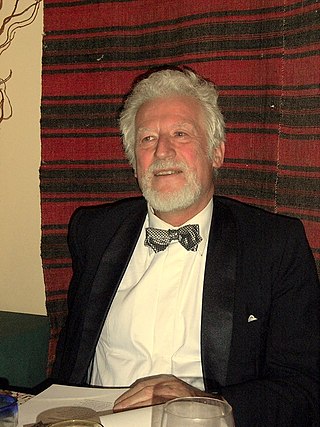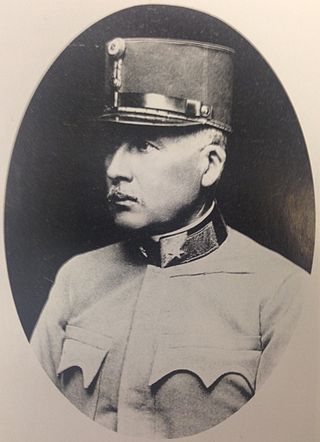
Austrian Nazism or Austrian National Socialism was a pan-German movement that was formed at the beginning of the 20th century. The movement took a concrete form on 15 November 1903 when the German Worker's Party (DAP) was established in Austria with its secretariat stationed in the town of Aussig. It was suppressed under the rule of Engelbert Dollfuss (1932–34), with its political organization, the DNSAP banned in early 1933, but was revived and made part of the German Nazi Party after the German annexation of Austria in 1938.

Edmund Glaise-Horstenau was an Austrian Nazi politician who became the last Vice-Chancellor of Austria, appointed by Chancellor Kurt Schuschnigg under pressure from Adolf Hitler, shortly before the 1938 Anschluss.
The German Workers' Party in Austria-Hungary was the predecessor of the Austrian and Czechoslovak Deutsche Nationalsozialistische Arbeiterpartei (DNSAP), founded on 14 November 1903, in Aussig, Bohemia. Its founder was Ferdinand Burschofsky.
The Österreichische Alpenfahrt was a rally that was part of the inaugural World Rally Championship in 1973.

Rudolf Simek is an Austrian philologist and religious studies scholar who is Professor and Chair of Ancient German and Nordic Studies at the University of Bonn. Simek specializes in Germanic studies, and is the author of several notable works on Germanic religion and mythology, Germanic peoples, Vikings, Old Norse literature, and the culture of Medieval Europe.

Johann Baptist Mayrhofer was an Austrian poet and librettist. He is best known for his close friendship with the composer Franz Schubert.

The Supreme Commander of the Imperial and Royal Armed Forces was the ultimate authority of the Austro-Hungarian Armed Forces – which comprised the Army, Navy and Aviation Troops of Austria-Hungary.

Celeste Coltellini was an Italian soprano. She was a well-known singer of opera buffa in Europe in the late 18th century.
Claus Pias is a German media theorist and media historian. He is a professor for history and epistemology of media at the Institute for Culture and Aesthetics of Digital Media (ICAM) at Leuphana University in Lueneburg., Germany.
Christa Ehrmann-Hämmerle is a Swiss-born Austrian historian. She is Associate Professor of Modern History at the University of Vienna. Her work focuses on military history, particularly World War 1, as well as women and gender history of the 19th and 20th centuries. Since 2011, she has been a spokeswoman for the Military History Working Group. She is co-founder and co-editor of the scientific journal L'Homme - Europäische Zeitschrift für Feministische Geschichtswissenschaft.
Edith Saurer was an Austrian historian, university professor at the University of Vienna, scientific author, and publisher. She is regarded as a central cofounder and advocate of feminist historiography in Austria. She received the Käthe Leichter Prize, Gabriele Possanner State Prize, and the Golden Medal for her services to the State of Vienna.
Margarete Charlotte Haimberger-Tanzer was an Austrian lawyer, prosecutor and judge. Haimberger-Tanzer was the first woman to serve as a criminal judge at a court in the Republic of Austria and one of the first female judges in Austrian legal history. In 1950, Margarete Haimberger was appointed as the first woman criminal judge and thereby initially transferred to the district court Bad Ischl. A year later, she returned to the Vienna Regional Court for Criminal Matters, where she was the first examining magistrate and in 1956 was the first woman chairing a Schöffenverhandlung.
Hartmut Krones is an Austrian musicologist.
Josef Ehmer was an Austrian historian and professor emeritus at the University of Vienna.
Ilse Erika Korotin is an Austrian philosopher and sociologist. She researched and published on the history of ideas of Nazism. At the Institute for Science and Art in Vienna, she heads the Documentation Centre for Women's Studies. Her work focuses on feminist biographical research and history of science.

Maximilian – Das Spiel von Macht und Liebe, released in the United States as Maximilian and Marie De Bourgogne or simply Maximilian, is a 2017 German-Austrian three-part historical miniseries. It is set in 1477, and stars Jannis Niewöhner as Maximilian I and Christa Théret as Mary of Burgundy. It was directed by Andreas Prochaska. It had its world premiere at the Urania movie theater in Vienna, then aired on the Austrian network ORF 1 in March 2017, and on the German network ZDF in October 2017. It was acquired and made available for streaming by American cable network Starz in April 2018.

Helmut Birkhan is an Austrian philologist who is Professor Emeritus of Ancient German Language and Literature and the former Managing Director of the Institute for Germanic Studies at the University of Vienna.

Józef Jan Klemens Pomiankowski was a lieutenant field marshal of the Austro-Hungarian Army and later general of the Polish Armed Forces. He was the military representative of the Austro-Hungarian military mission in the Ottoman Empire in the World War I, during which he was in charge of shaping Austrian policy on the Orient, often in competition with the allied German Empire.

Murray G. Hall was a Canadian Germanist and specialist in literature.
Lucie Varga was an Austrian historian, best remembered as a pioneer of the history of mentalities, as a member of the Annales school of social history. She wrote several articles for the Annales. Histoire, Sciences Sociales journal as an assistant to Lucien Febvre. Married to Franz Borkenau, her writings were popularised by Peter Schöttler.










